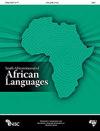Ubugqirha : healing beyond the Western gaze
IF 0.4
0 LANGUAGE & LINGUISTICS
引用次数: 0
Abstract
AbstractThis article explores what African languages teach us about the concept of healing using the Xhosa language (isiXhosa) of South Africa as a model. From an African perspective, the names used to label the environment and phenomena guide us on how we should perceive them. For example, in isiXhosa, a healer is called ugqirha, which means they personify ubugqi (the power to perform unexplainable deeds); the concept will be explored to illustrate the ethic behind the sacredness with which healing knowledge is treated. A healer, therefore, embodies the ability to act beyond comprehension. This brings the ethos of Western pedagogy into question. If, through language, we learn that a phenomenon such as healing is beyond comprehension, how then should healing be part of the curriculum? The article concludes that sacred knowledges should be handled ethically and that the ethics of dissemination of sacred knowledge such as ubugqirha are often embedded in their naming.Ubugqirha:超越西方视线的治疗
摘要本文以南非科萨语(isiXhosa)为例,探讨了非洲语言教给我们的关于治疗的概念。从非洲的角度来看,用于标记环境和现象的名称指导我们如何看待它们。例如,在伊西科萨语中,治疗师被称为ugqirha,这意味着他们是ubugqi(执行无法解释的行为的力量)的化身;这个概念将被探讨,以说明背后的伦理与治疗知识的神圣性。因此,治疗师体现了超越理解的行动能力。这使西方教育学的精神受到质疑。如果通过语言,我们了解到像治疗这样的现象是无法理解的,那么治疗应该如何成为课程的一部分呢?本文的结论是,神圣的知识应该被伦理地处理,而传播神圣知识的伦理,如ubugqirha,往往嵌入在它们的命名中。
本文章由计算机程序翻译,如有差异,请以英文原文为准。
求助全文
约1分钟内获得全文
求助全文
来源期刊

South African Journal of African Languages
LANGUAGE & LINGUISTICS-
CiteScore
0.50
自引率
0.00%
发文量
30
期刊介绍:
The South African Journal of African Languages is a peer-reviewed research journal devoted to the advancement of African (Bantu) and Khoi-San languages and literatures. Papers, book reviews and polemic contributions of a scientific nature in any of the core areas of linguistics, both theoretical (e.g. syntax, phonology, semantics) and applied (e.g. sociolinguistic topics, language teaching, language policy), and literature, based on original research in the context of the African languages, are welcome. The journal is the official mouthpiece of the African Language Association of Southern Africa (ALASA), established in 1979.
 求助内容:
求助内容: 应助结果提醒方式:
应助结果提醒方式:


